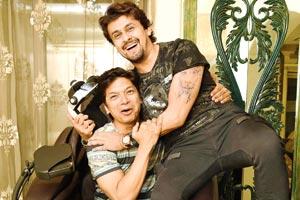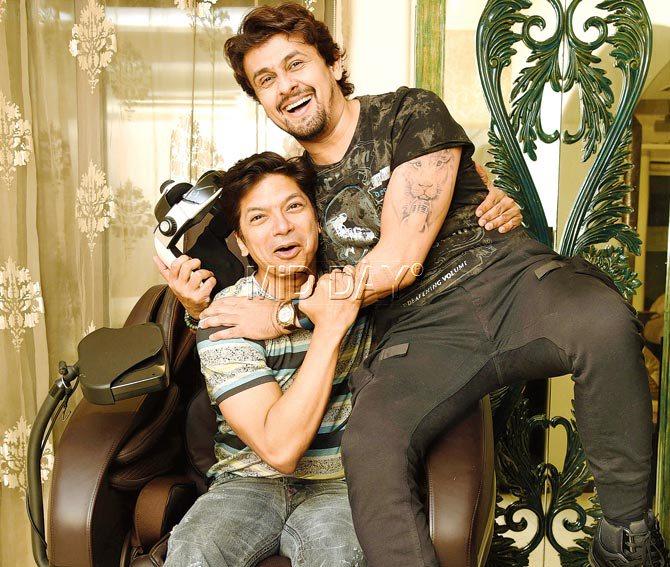Shaan remembers his days of struggle with interviewer-cum-friend Sonu Nigam, as they speak about their musical journeys


Shaan and Sonu Nigam. Pics/Rane Ashish
While we thought getting two titans of the Indian music fraternity under the same roof would be a tough nut to crack, Sonu Nigam and Shaan made it seem like a cakewalk. In the cosy living room of Nigam's Versova home, the two transitioned from being musicians to interviewers, with utmost ease. Nigam had the perfect question to set the ball rolling, "Bhai, mere Karjat farmhouse kab chal raha hai?"
ADVERTISEMENT
Edited excerpts from the interview.
Sonu to Shaan
You were initially known in the industry as Raja. How did you become Shaan?
Raja was not only my nickname, but also a contracted one. When I was collaborating with Raju [Singh, composer] on a Zee [Music] project in 1993, he asked me to sign the contract under that name Raja. Biddu [composer-producer] changed it from Raja to Shaan. He said Shaantanu [his original name] was too long a name. I was okay shortening it to Shaan because I liked the name, and found Shaantanu slightly thanda.
When did you first realise there is a musician in you?
I was 16, and I'd lost my dad. Until then, while singing, I would struggle to get the nuances of other singers right. Once I tried singing Mohammed Rafi saab's Subhanallah Haseen Chehra from Kashmir Ki Kali (1964) and pulled it off perfectly. I got all the notes right. I also felt as if I saw my dad's shadow on the window then. It was
a spiritual moment for me.
What made you pursue music as a profession?
Since my dad had struggled to make a mark in the music industry, I decided to pursue it diligently. When I realised that I have the potential to make it big, I started singing jingles alongside doing odd jobs like taking tuitions and selling cable TV points. I also ran a DTP service, where I would create layouts and print material for clients like Jet Airways, East-West Airlines, Maersk, etc. But I was certain about growing as a musician. Since I got married around the same time, the sense of responsibility grew and I became more focused on my singing career.
When the texture of your voice changed in teenage years, how did you deal with it?
It was a tough time. When I started singing jingles at the age of five, I was made to stand right in front of the mic alongside other kids. But as I grew older and my voice began to get hoarse, I was made to stand further away from the mic. I felt so discouraged that I asked them to not call me again.
(Sonu adds)
When my voice was undergoing a transition and I wasn't able to hit the higher notes, my dad [singer Agam Kumar Nigam] couldn't understand why I was complaining about it. I was taken to doctors and given penicillin injections because they suspected that I had swollen tonsils. The injections were so painful that I would limp on my way back home. One day, I was rehearsing a song sung by Vijay Benedict from the Doordarshan show, Manoranjan, in front of the mirror. That's when I realised that my voice had come down one octave perfectly.
Did you learn music from anyone other than Ghulam Mustafa Khan saab?
I had attended some classes at Suresh Wadkarji's academy. Since my preparation was not up to the mark, I skipped the exams and was too embarrassed to resume classes after that.
Are you disappointed when you record a song that has been attempted by multiple singers, and your version is not chosen?
Of course, it pinches. But I'm okay with the idea of recording a track that's also sung by others because I find the process challenging. When I feel my version was better than the one chosen by the makers, I just feel bad for the song (laughs).
What do you think of the way the business of music has changed over the years?
I started out as a pop singer, when people bought music and music labels backed independent projects. Now, even if you have a composition and lyrics, you need money for the production of a track. You need to invest money to shoot a music video and sometimes to also buy hits online. Today, the business of music has literally turned into a 'business' that only singers with money can 'invest' into. Of course, there are some extremely talented singers, but they are exceptions, not the rule.
Shaan to Sonu
You keep taking breaks from work frequently to travel. What's the reason behind it?
Throughout childhood, my parents never took us on vacations. It's not that we were poor; the concept of a vacation didn't exist at our home. In fact, despite having settled down in Mumbai in 1991, it wasn't until three years later that I went to the Gateway Of India at Babul Supriyo's insistence. I was so focused that my travel otherwise was limited to home and studio. I realised that I shouldn't grow old like this. That's when I started going on vacations. My South Africa trip in 2001 was the turning point — I was at Signal Hill alone and had never experienced such silence before. That's when I realised that breaks are important. I went trekking in the Himalayas. Lately, I've been going to Rishikesh a lot. Sitting on the banks of the Ganga, attending aartis and visiting ashrams gives me solace.
What is your mantra to be in sur during gigs?
There's no mantra. It's to do with the technique. If I start off perfectly, everything goes off well.
(Shaan adds)
I remember attending a show in Canada, where you performed alongside several other singers. All of them were off tune, but the moment you came on stage, you hit
the bull's eye. I was amazed by your talent.
What do you prefer — when composers decide the structure of a song and ask you to replicate it, or when they give you the freedom to improvise?
It's good when composers have a clear vision, but I enjoy more when they are open to improvisation. For instance, I recently recorded the song Kulfi from 102 Not Out with Salim-Sulaiman. They are talented composers. While I was singing, Salim said, "Kuch apni taraf se karo, yaar." Aise kaam karne mein mazaa aata hai.
How did you widen your range to adapt to the trend of high-pitch singing?
As soon as I took note of the increasing demand for high-pitched singing, I started practising techniques to increase my range. In a few months, I started hitting notes that were five-six semitones higher than what I was comfortable singing earlier.
You may also like
Catch up on all the latest entertainment news and gossip here. Also download the new mid-day Android and iOS apps to get latest updates
 Subscribe today by clicking the link and stay updated with the latest news!" Click here!
Subscribe today by clicking the link and stay updated with the latest news!" Click here!







